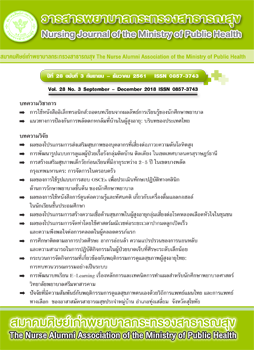Factors Related to Self-Care Behaviors using Thai Traditional Medicine and Alternative Medicine of Village Health Volunteers in Thung Saliam District, Sukhothai Province
Main Article Content
Abstract
The objectives of this correlational research was to study self-care behaviors using Thai The objectives of this correlational research was to study self-care behaviors using Thai traditional medicine and alternative medicine of village health volunteers and to examine factors related to self-care behaviors of village health volunteers in Tung Saliam District, Sukhothai Province. The samples were 394 village health volunteers. The systematic random sampling was used to recruit the samples. Data were collected by using questionnaire with a reliability of .81, analyzed by using descriptive statistics, Pearson correlation coefficient and ETA at significant level of .05. The results revealed that 63.2% of the samples had low levels of self-care behaviors using Thai traditional medicine and alternative medicine styles follow by 91.4.% had excellence level of the Thai traditional medicine and alternative medicine knowledge and 98.5% had low level of attitude toward to self-care behaviors. The factors related to self-care behaviors of village health volunteers using Thai traditional medicine and alternative medicine in positive correlation was attitudes towards to self-care behaviors (r=.260, p<.001) For the knowledge had negative correlation with self-care behaviors (r=-.241, p<.001) at the significance level of .05. The suggestion: the attitudes toward self-care behaviors using Thai traditional medicine and alternative medicine is an important factor that should be developed as a behavioral change program for village health volunteers.
Article Details
บทความและรายงานวิจัยในวารสารพยาบาลกระทรวงสาธารณสุข เป็นความคิดเห็นของ ผู้เขียน มิใช่ของคณะผู้จัดทำ และมิใช่ความรับผิดชอบของสมาคมศิษย์เก่าพยาบาลกระทรวงสาธารณสุข ซึ่งสามารถนำไปอ้างอิงได้
References
2. Steering Committee on Formulation of National Health Development Plan. The Ninth National Health Development Plan (2001-2006). Bangkok: The War Veterans Organization of Thailand; 2001. (in Thai)
3. Department of Health Service Support. Modernistic Village Health Volunteers Guideline. Bangkok: The War Veterans Organization of Thailand. 2016. (in Thai)
4. Office of the National Economic and Social Development Board. The Eleventh National Economic and Social Development Plan B.E. 2555-2559 (A.D. 2012–2016). Bangkok: Office of the Prime Minister; 2012. (in Thai)
5. Worapisuttiwong N. Factors relating self-care behaviors concerning Thai Traditional Medicine of students in Applied Thai Traditional Medicine program Faculty of Science and Technology Suan Sunandha Rajabhat University (Master of Science).Health Education, Depatment of Physical Education. Bangkok: Kasetsart University; 2010.
6. Chainarong W. Factors Related to Using Herbs for Primary Treatment Behaviors of People in Thanyaburi District, Pathum Thani Province (Master of Science). Health Education, Depatment of Physical Education. Bangkok: Kasetsart University; 2011.
7. Woradet S, Chaimay B, Salaea R, Kongme Y. Factors Associated with Herbal Used Behavior towards Self Care among Village Health Volunteers in Krung La District, Phatthalung Province. Journal of Health Science 2015;24(1):50-9.
8. Kengganpanich T, Leerapan P, Kengganpanich M, Nunthasen K, Lattanand K. Factors related to Herbal consumption for controlling blood sugar of patients with type 2 diabetes mellitus. Journal of Boromarajonani College of Nursing. 2015;31(1):13-25. (in Thai)
9. World Health Organization (WHO). Advocacy, communication and social mobilization for TB control: a guide to developing knowledge, attitude and practice surveys. WHO; 2008.
10. Department of Thai Traditional Medicine and Alternative Medicine. A Guide to Health Promotion and Prevention with Traditional Thai Medicine and Alternative Medicine Ministry of Public Health; 2012. (in Thai)

